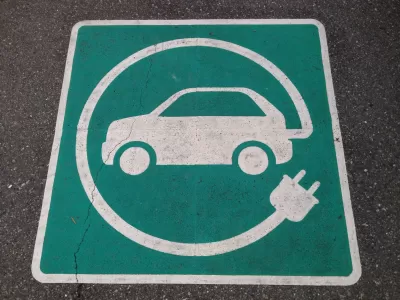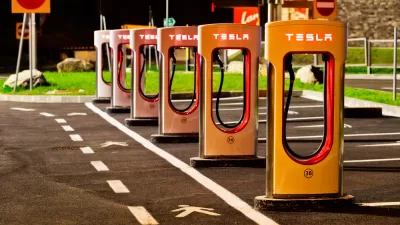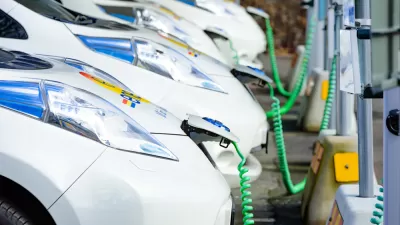The Senate Majority Leader's plan would pump more than $50 billion into direct incentives for consumers, manufacturers, and property owners.

As part of the push to shift American energy consumption to more sustainable sources, Senate Majority Leader Chuck Schumer plans to revive "his ambitious proposal to get every American to swap their gas-guzzling car for an electric one," reports Andrew J. Hawkins in The Verge.
First proposed in 2019, the plan would create a "cash-for-clunkers"-type program to give consumers "a 'substantial' point-of-sale discount" when trading in a gas-powered car for an electric one. "A spokesperson later confirmed they are eyeing rebates that are 'more generous' than the current $7,500 federal EV tax credit." The proposal also calls for "direct incentives to auto manufacturers to phase out their production of internal combustion engine vehicles and tax breaks for property owners to install EV chargers at their homes or apartment buildings," as well as $45 billion in grants and subsidies to local governments to improve the nation's network of EV charging stations. But with only 17% of the country's electrical grid drawing from renewable sources, "electric vehicles are only as green as their power source."
Some transit advocates criticize the plan, saying they "would rather see that sum of money spent on strengthening the nation’s public transportation infrastructure, especially at a time when the COVID-19 pandemic has caused a huge drop-off in ridership." Schumer has responded that he is "working on a 'large investment in clean mass transit' right now, which he also hopes to include as part of the Democratic infrastructure proposal."
FULL STORY: CHUCK SCHUMER WANTS TO REPLACE EVERY GAS CAR IN AMERICA WITH AN ELECTRIC VEHICLE

Alabama: Trump Terminates Settlements for Black Communities Harmed By Raw Sewage
Trump deemed the landmark civil rights agreement “illegal DEI and environmental justice policy.”

Planetizen Federal Action Tracker
A weekly monitor of how Trump’s orders and actions are impacting planners and planning in America.

Why Should We Subsidize Public Transportation?
Many public transit agencies face financial stress due to rising costs, declining fare revenue, and declining subsidies. Transit advocates must provide a strong business case for increasing public transit funding.

Judge Orders Release of Frozen IRA, IIJA Funding
The decision is a victory for environmental groups who charged that freezing funds for critical infrastructure and disaster response programs caused “real and irreparable harm” to communities.

‘Clybourne Park’ Sets Stage for Housing Equity Discussions
Clybourne Park, a play exploring race, real estate, and community tensions, can set the stage for discussion on the lasting impacts of housing discrimination, gentrification, and the fight for affordability.

Understanding Road Diets
An explainer from Momentum highlights the advantages of reducing vehicle lanes in favor of more bike, transit, and pedestrian infrastructure.
Urban Design for Planners 1: Software Tools
This six-course series explores essential urban design concepts using open source software and equips planners with the tools they need to participate fully in the urban design process.
Planning for Universal Design
Learn the tools for implementing Universal Design in planning regulations.
Caltrans
Smith Gee Studio
Institute for Housing and Urban Development Studies (IHS)
City of Grandview
Harvard GSD Executive Education
Toledo-Lucas County Plan Commissions
Salt Lake City
NYU Wagner Graduate School of Public Service





























